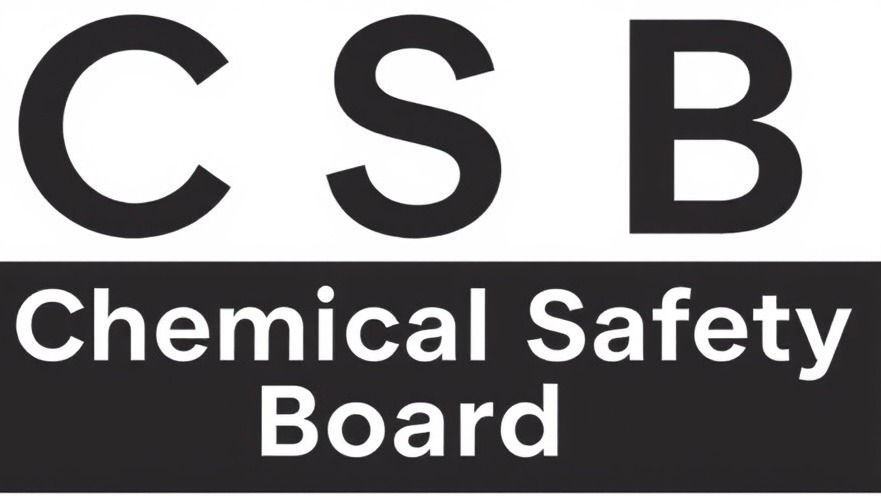
Unpacking the Closure of the Chemical Safety Board
As climate events become more severe and industrial incidents more frequent, the proposed elimination of the Chemical Safety Board (CSB) raises alarm bells for communities living near petrochemical facilities, particularly in Texas. In a state with a multitude of chemical plants, the CSB has historically served as a critical independent entity, investigating industrial accidents and providing essential recommendations. This lack of oversight could leave the health and safety of residents at risk, especially in high-stakes environments like Houston's bustling petrochemical corridor.
The CSB's Vital Role in Industrial Safety
The CSB conducts thorough investigations into hazardous incidents, often revealing critical failures in safety practices. In recent years, incidents like the catastrophic fire at Intercontinental Terminals Co. serve as stark reminders of the dangers of operating without adequate safety oversight. With more than 20 investigations in Texas alone, the CSB offers invaluable insights that help prevent future accidents and protect public health, demonstrating the need for its continued operation amidst a rapidly evolving industrial landscape.
Why the Proposed Shutdown Matters
The Trump administration justifies the CSB's proposed defunding by claiming it overlaps with the responsibilities of the EPA and OSHA. However, critics argue that this undermines an essential independent watchdog that specializes solely in chemical safety. Should the CSB be dissolved, essential safety measures that have been put in place could be jeopardized, leaving old vulnerabilities unaddressed. “The value of a specialized oversight body cannot be understated,” says Katherine Culbert, a senior process safety engineer. “If multiple agencies share responsibility, important insights may slip through the cracks.”
Recent Chemical Disasters in Texas: A Readiness Alert
Over the past few decades, Texas has seen its fair share of industrial mishaps, including the explosive fires and toxic releases that prompted prolonged evacuations and long-term health concerns in affected areas. The CSB has been instrumental in analyzing such disasters, developing recommendations designed to minimize risk. For instance, following high-profile accidents, the agency has advocated for improved safety practices that have resulted in fewer incidents and better emergency preparedness in facilities across the region. With its potential closure, there is real fear that government agencies may take a backseat in prioritizing safety in lieu of regulatory redundancy.
Imagining a Future Without the CSB
If the budget cuts go through as planned and the CSB is shuttered, the full implications are hard to foresee but disheartening to consider. Increased reliance would fall on the companies themselves to self-regulate, an action fraught with conflicts of interest. Community organizations and local labor unions could be left to fill the gap, a task with limited resources and expertise. This precarious reliance could create an environment where safety takes a backseat to cost-cutting and efficiency, putting protection against chemical accidents at risk.
Public Health Consequences and Community Action
The proposed elimination of the CSB collides with broader health implications for residents living near chemical plants. Public health officials warn that closer scrutiny is crucial as climate extremes intensify and industrial operations expand. Without federal oversight, communities such as Deer Park, which have faced environmental crises before, could see a regression in safety measures, leading to health issues related to exposure to hazardous materials. Even though these scenarios seem distant, the ongoing conversations around the necessity of a dedicated safety board are critical for advocating community safety and protection.
Texas Residents: What Can You Do?
Residents can voice their concerns to local and state representatives, urging them to recognize the importance of the CSB's work. With the Texas legislative session approaching, it’s crucial that individuals advocate for strict safety standards and emphasize the necessity for an independent board to continue overseeing chemical operations. Following public hearings and open forums can also serve as a platform for affected communities to discuss their fears and push for change.
Conclusion: Call to Action
In the face of regulatory changes that could deeply affect community safety, Texan residents are encouraged to remain vigilant and proactive about local environmental issues. Understanding the implications of eliminating important safety oversight is vital in ensuring public health and safety. Stay informed, and participate in local advocacy efforts to keep our communities safe from industrial accidents that can have long-lasting consequences.
 Add Element
Add Element  Add Row
Add Row 



Write A Comment